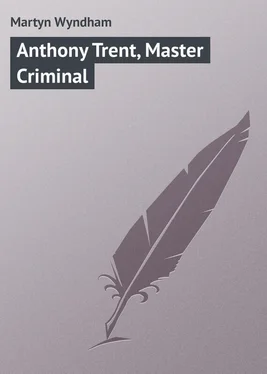Wyndham Martyn - Anthony Trent, Master Criminal
Здесь есть возможность читать онлайн «Wyndham Martyn - Anthony Trent, Master Criminal» — ознакомительный отрывок электронной книги совершенно бесплатно, а после прочтения отрывка купить полную версию. В некоторых случаях можно слушать аудио, скачать через торрент в формате fb2 и присутствует краткое содержание. Жанр: Классический детектив, foreign_detective, foreign_prose, на английском языке. Описание произведения, (предисловие) а так же отзывы посетителей доступны на портале библиотеки ЛибКат.
- Название:Anthony Trent, Master Criminal
- Автор:
- Жанр:
- Год:неизвестен
- ISBN:нет данных
- Рейтинг книги:4 / 5. Голосов: 1
-
Избранное:Добавить в избранное
- Отзывы:
-
Ваша оценка:
- 80
- 1
- 2
- 3
- 4
- 5
Anthony Trent, Master Criminal: краткое содержание, описание и аннотация
Предлагаем к чтению аннотацию, описание, краткое содержание или предисловие (зависит от того, что написал сам автор книги «Anthony Trent, Master Criminal»). Если вы не нашли необходимую информацию о книге — напишите в комментариях, мы постараемся отыскать её.
Anthony Trent, Master Criminal — читать онлайн ознакомительный отрывок
Ниже представлен текст книги, разбитый по страницам. Система сохранения места последней прочитанной страницы, позволяет с удобством читать онлайн бесплатно книгу «Anthony Trent, Master Criminal», без необходимости каждый раз заново искать на чём Вы остановились. Поставьте закладку, и сможете в любой момент перейти на страницу, на которой закончили чтение.
Интервал:
Закладка:
“Ah, but that’s in a story,” returned the author.
“Then you mean they aren’t as exact and possible as you’ve been telling me?”
“They are what I said they were,” their author declared. “They could be worked out, with ordinary luck, by any man with an active body, good education and address. The typical thick-witted criminal wouldn’t have a chance.”
It was a curious thing, thought Anthony Trent, that Crosbeigh should mention the very thing that had been running in his mind for weeks. To live in such an elaborate manner as Conington Warren was not his ambition. The squandering of large sums of money on stage favorites of the moment was not to his taste; but he wanted certainly more than he was earning. Trent had a passion for fishing, golf and music. Not the fishing that may be indulged in on Sunday and week-day on fishing steamers, making excursions to the banks where one may lose an ear on another angler’s far flung hook, but the fly fishing where the gallant trout has a chance to escape, the highest type of fishing that may appeal to man.
And his ambitions to lower his golf handicap until it should be scratch could not well be accomplished by his weekly visit to Van Cortlandt Park. He wished to be able to join Garden City or Baltusrol and play a round a day in fast company. And this could not be accomplished on what he was making.
And as to music, he longed to compose an opera. It was a laudable ambition and would commence, he told himself, with a grand piano. He had only a hard-mouthed hired upright so far. Sometimes he had seen himself in the rôle of his hero amply able to indulge himself in his moderate ambitions. It was of this he had been thinking when Mr. Lund came to his room. And now the very editor for whom he had created his characters was making the suggestion.
“I was only joking,” Crosbeigh assured him.
“It is not a good thing to joke about,” Anthony Trent answered, “and an honest man at forty a week is better than an outlaw with four hundred.”
He made this remark to set his thoughts in less dangerous channels, but it sounded dreadfully hollow and false. He half expected that Crosbeigh would laugh aloud at such a hackneyed sentiment, but Crosbeigh looked grave and earnest. “Very true,” he answered. “A man couldn’t think of it.”
“And why not?” Anthony Trent demanded; “would the fictional character I created do as much harm to humanity as some cotton mill owner who enslaved little children and gave millions to charity?”
A telephone call relieved Crosbeigh of the need to answer. Trent swept into his brief case the carbon copy of his story which he had brought by mistake.
“Where are you going?” the editor demanded.
“Van Cortlandt,” the contributor answered; “I’m going to try and get my drive back. I’ve been slicing for a month.”
“Conington Warren has a private eighteen-hole course on his Long Island place,” Crosbeigh said with pride. “I’ve been invited to play.”
“You’re bent on driving me to a life of crime,” Trent exclaimed frowning. “An eighteen-hole private course while I struggle to get a permit for a public one!”
But Anthony Trent did not play golf that afternoon at Van Cortlandt Park. As a matter of fact he never again invaded that popular field of play.
Outside Crosbeigh’s office he was hailed by an old Dartmouth chum, one Horace Weems.
“Just in time for lunch,” said Weems wringing his hand. Weems had always admired Anthony Trent and had it been possible would have remodeled himself physically and mentally in the form of another Trent. Weems was short, blond and perspired profusely.
“Hello, Tubby,” said Trent without much cordiality, “you look as though the world had been treating you right.”
“It has,” said Weems happily. “Steel went to a hundred and twelve last week and it carried me up with it.”
Weems had been, as Trent remembered, a bond salesman. Weems could sell anything. He had an ingratiating manner and a disability to perceive snubs or insults when intent on making sales. He had paid his way through college by selling books. Trent had been a frequent victim.
“What do you want to sell me this time?” he demanded.
“Nothing,” Weems retorted, “I’m going to buy you the best little lunch that Manhattan has to offer. Anywhere you say and anything you like to eat and drink.” Weems stopped a cruising taxi. “Hop in, old scout, and tell the pirate where to go.”
Trent directed the man to one of the three famous and more or less exclusive restaurants New York possesses.
“I hope you have the price,” he commented, “otherwise I shall have to cash a check I’ve just received for a story.”
“Keep your old check,” jeered Weems, “I’m full of money. Why, boy, I own an estate and have a twelve-cylinder car of my own.”
Over the luncheon Horace Weems babbled cheerfully. He had made over three hundred thousand dollars and was on his way to millionairedom.
“You ought to see my place up in Maine,” he said presently.
“Maine?” queried his guest. It was in Maine that Anthony Trent, were he fortunate enough, would one day erect a camp. “Where?”
“On Kennebago lake,” Weems told him and stopped when an expression of pain crossed the other’s face. “What’s the matter? That sauce wrong?”
“Just sheer envy,” Trent admitted, “you’ve got what I want. I know every camp on the Lake. Which is it?”
“The Stanley place,” said Weems. “The finest camp on the whole Lake. I bought it furnished and it’s some furniture believe me. There’s a grand piano – that would please you – and pictures that are worth thousands, one of ’em by some one named Constable. Ever hear of him?”
“Yes,” Trent grunted, “I have. Fancy you with a Constable and a grand piano when you don’t know one school of painting from another and think the phonograph the only instrument worth listening to!”
“I earned it,” Weems said, a little huffily. “Why don’t you make money instead of getting mad because I do?”
“Because I haven’t your ability, I suppose,” Trent admitted. “It’s a gift and the gods forgot me.”
“Some of the boys used to look down on me,” said Weems, “but all I ask is ‘where is little Horace to-day?’ This money making game is the only thing that counts, believe me. Up in Hanover I wasn’t one, two, three, compared with you. Your father was well off and mine hadn’t a nickel. You graduated magna cum laude and I had to work like a horse to slide by. You were popular because you made the football team and could sing and play.” Weems paused reflectively, “I never did hear any one who could mimic like you. You should have taken it up and gone into vaudeville. How much do you make a week?”
“Forty – with luck.”
“I give that to my chauffeur and I’m not rich yet. But I shall be. I’m out to be as rich as that fellow over there.”
He pointed to a rather high colored extremely well dressed man about town to whom the waiters were paying extreme deference.
“That’s Conington Warren,” Weems said with admiration in his voice, “he’s worth a million per annum.”
Anthony Trent turned to look at him. There was no doubt that Conington Warren was a personage. Just now he was engaged in an argument with the head waiter concerning Château Y’Quem . Trent noticed his gesture of dismissal when he had finished. It was an imperious wave of his hand. It was his final remark as it were.
“Some spender,” Weems commented. “Who’s the funny old dodger with him? Some other millionaire I suppose.”
“I’ll tell him that next time I see him,” laughed Trent beholding Crosbeigh, Crosbeigh who looked wise where vintages were discussed and knew not one from another. A well-dressed man paused at Warren’s side and Weems, always anxious to acquire information, begged his guest to be silent.
Читать дальшеИнтервал:
Закладка:
Похожие книги на «Anthony Trent, Master Criminal»
Представляем Вашему вниманию похожие книги на «Anthony Trent, Master Criminal» списком для выбора. Мы отобрали схожую по названию и смыслу литературу в надежде предоставить читателям больше вариантов отыскать новые, интересные, ещё непрочитанные произведения.
Обсуждение, отзывы о книге «Anthony Trent, Master Criminal» и просто собственные мнения читателей. Оставьте ваши комментарии, напишите, что Вы думаете о произведении, его смысле или главных героях. Укажите что конкретно понравилось, а что нет, и почему Вы так считаете.












